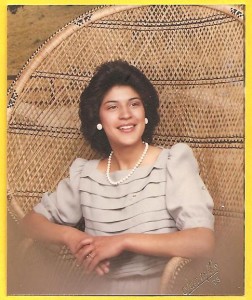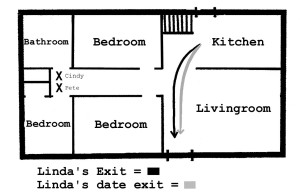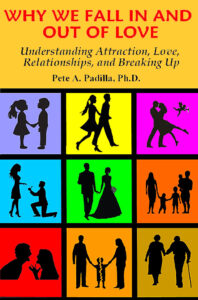Chapter 8:
[Key #8] Love and Hate, versus Indifference: Knowing the Difference Is Important
“Love me or hate me, but spare me your indifference”
– Libby Fidum
“Indifference is the strongest force in the universe. It makes everything it touches meaningless. Love and hate don’t stand a chance against it.”
– Joan Vinge.
American culture tends to divide our view of “things” into artificial dichotomies. Such thinking makes it appear that only two sides exist to every issue. For example, “things” are conservative or liberal; good or bad; wrong or right; or are assigned to any other number of opposing categories.
In some instances, there is nothing inherently wrong with perceiving our social world in these opposing yet artificial terms. However, when we think only in this manner, sometimes these supposed “opposing” views are really artificial dichotomies.
In most instances, there is usually some sort of grey involved with social matters. Therefore, whenever people use this type of limited thinking, they loose sight of a swatch of some pretty important grey areas that may be as equally important as the two more conventional views of “things.” This is especially true when it comes to relationships. According to E.L. James, there are at least fifty shades of grey.
These artificial dichotomies are, however, human constructions. What I mean by this is that artificial dichotomies often lead to thinking that doesn’t necessarily represent the way “the universe” functions. These artificial ways of looking at the world aren’t necessarily accurate representations of how humans should view, interpret, and ultimately act upon the world they perceive in front of them.
When it comes to relationships, people often perceive their feelings for their partner in such an artificial manner. Take for example, when we think about a couple that is getting along; we are taught to think that the couple must have only positive feelings toward one another. On the other hand, when the couple is not getting along, we are taught to think that the couple must have only negative feelings toward one another. Yet in each case, the couples probably had both negative as well as positive feelings toward one another. It would be a stretch to think that couples vacillate between being only upset with one another to being only in love in such a quick succession.
This common-sense “opposing ideas” perceptional tendency of relationships, however, tends to hide, or limit, our understanding of how they actually function. By limiting the perceptual tendencies to only two possibilities, people often misperceive what is actually happening in the grey areas of their relationships.
These misconceptions also affect the way relationship partners interpret their own emotions. Because of this tendency to limit “things” to only two choices, people may not understand their true feelings.
Take, for example, the phenomenon of “caring” about someone. In essence, this means that someone starts to experience an emotional draw toward another person. In everyday language some people refer to this as, “catching feelings.”
When people are getting what they expect out of a relationship, such as love, affection, sex, or any other enjoyable aspect of “caring,” they generally experience positive feelings. That is, they feel contented about their status in the relationship. On the other hand, whenever people are not receiving these types of positive aspects of being in a relationship, but instead experience deceit, distrust, or any other negative aspect associated with their relationships,” they generally experience negative feelings about their status in the relationship.
Yet, just because someone is experiencing negative feelings toward their partner doesn’t necessarily mean they don’t “care” about them. Whenever someone is pissed off, it is precisely because they “care” about the other person that they are feeling that way. The cold hard truth is that love and hate are both categories of “caring.” After all, being pissed off at someone still requires an emotional investment in the issue at hand. Truthfully, being pissed off at someone means “caring” enough about them to be pissed off.
“The cold hard truth is that love and hate are both categories of ‘caring.’”
On the other hand, it is when someone feels indifferent about a person/ relationship that they are truly experiencing feelings that are the opposite of “caring.” They don’t “care” enough to be pissed off. In short, indifference is the lack of “caring.”
I am aware of the fact that many readers will become upset by me making the claim that negative feelings are often measures of how much one “cares” about their partner. I am overtly asserting that some individuals do use the tactic of deliberately trying to make their partner jealous and/ or upset to measure whether or not their partners have feelings for them.
Such negative-based tactics don’t necessarily mean that the perpetrator is misguided in their quest to measure their partner’s love for them as some academic thinkers would claim. Such tactics may serve such a purpose quite well actually. It would be more accurate to argue that such an approach is immature or perhaps even unhealthy.
Just keep in mind that the feelings of love and hate both require an emotional component. Thus, they are not complete opposites of each other. The opposite of “caring” about a person is to not “care” about them. Thus, when an individual doesn’t “care’ about their partner, they are indifferent towards them. Thus, the true opposite of love and hate is indifference.
Linda, the Party, And Then Acting on a Hunch
One late summer, my girlfriend Linda and I were suffering through one of our frequent breakup events. And by this time, I had accepted the fact that since we would both be going off to separate colleges soon, this was probably the real thing and not our usual “break up to make up” routine. So I was getting mentally prepared for the inevitable.
Throughout most of that summer, I found a way to work out my relationship frustrations and to stay healthy at the same time. That is, I worked out religiously at the local community center gym. As a result of this discipline, my body shaped up nicely; I was looking good.
That August, shortly before Linda and I were both about to leave for separate colleges, I was invited to a party thrown by a mutual friend of ours. My gut told me to mentally prepare to see Linda at the party, and thankfully I listened to my instinct. So, in order to lessen any anxious feelings about attending the upcoming get-together, where I was likely to run into Linda, I invited my close friend Cindy along. She happened to be a bombshell. But more importantly, she was really fun to hang out with. Plus, whenever I was feeling sad, Cindy always found a way to lift my spirits.
Cindy
When Cindy and I arrived at the party, who do you think we saw almost immediately? If you guessed Linda, you would be correct. She and her date were sitting in the kitchen near the keg. But what caused me some immediate concern was that her date was an old neighborhood rival who had told me that if he ever had a chance to hook up with my girlfriend, that he’d “be all over her.” My stomach suddenly ached as my mood took a noticeable dive.
Cindy must have noticed my mood sink like a lead submarine, because she went off without me to get us a couple of beers. When she returned with them, she grabbed me by the hand and led me to a location as far removed from the keg as possible. We ventured all the way down the central hallway, stood outside the last far bedroom door, and tried our best to settle into the party scene.
The Party House Layout
But what were Cindy and I thinking? After an unending line of women had filed past us on their way to the bathroom, I suddenly realized something: this whole time, we had also been standing right next to the entrance to the only bathroom in the house. It was only a matter of time before every woman in the party would have to pass in our direction. That meant that Linda would eventually have to use that very bathroom.
In an instant, I became acutely aware that at any second, Linda could show up in that area of the party house. Sure enough, after about an hour, and with my mood on the upswing, I spotted Linda coming down the hall. She had already seen me and took immediate note that I was partying with my attractive friend Cindy. Linda must have thought that, like her, I was at the party with a date (I wasn’t on a date).
I can remember it as though it all happened in slow motion. Linda turned the corner to walk down the hall; not aware that I was in that area. So when her eyes spotted me, a look of concern crept across her face. But Linda kept on coming toward us as her face displayed more of a scowl as she neared where we were standing. She quickly got up in my face, and with some enthusiasm, she immediately began giving me a verbal dressing-down. But by this time, the alcohol was having its effect on me.
Normally her accusations would have intimidated me. But not this time though. Instead of frightening me, her scolding was producing a calm reassuring feeling. This calmness came as a complete surprise to me.
At that very moment, I had an epiphany. I suddenly realized that in order for Linda to be so upset at me, she must still have some feelings for me. I was elated! I was still in love with Linda, and at that moment, I realized that I still had a chance of reconciling with her. Otherwise, when she spotted me with Cindy, she would have acted indifferent and walked right past me like I wasn’t even there.
This newfound knowledge felt great, and it caused me to smile. Now I couldn’t control my smile. I was too excited to try an erase it from my face. I knew right then and there that I still had a chance with this woman to whom I was still very attracted.
Linda didn’t like that I was smiling. In fact, my smile only made her more upset, which resulted in even more dressing-down. But, the more she scolded me, the more I thought to myself that she still liked me; causing me to smile even more! Let’s just say our moods went in opposite directions; and they did so really quickly.
As it turned out, Linda didn’t even bother to use the restroom. She just turned around, marched back into the kitchen, and commanded that her date to take her home. I could hear him mumbling something about running into me, but I really didn’t care. A feeling of elation came over me as I watched her walk past the hallway on her way out of the party; her date in tow with a look of confusion on his face. With a renewed sense of confidence in the matter, Cindy and I partied like rock stars the rest of the night.
Linda and her date’s exit route
As soon as I woke up the next morning, I went on a mission. I had a hunch that I needed to act upon. With that smile from the night before still on my face, I decided to drive to Linda’s house and take a chance that my hunch was a valid one.
When I arrived, her mom and her little sister were getting ready to leave for church. Her little sister Ariel greeted me at the door with a big hug. I quietly asked her, “Where’s your sister?” Ariel asked me to wait in the foyer while she went upstairs to tell Linda that I was there, and that I wanted to talk to her.
Linda came out of her bedroom in time to witness her little sister and her mom head toward the front door where I was standing. Her mom brushed past me with a scowl on her face. She was obviously bothered by my presence. Linda, after all, was her daughter. Her mom’s obvious displeasure with me being there didn’t even faze me; because I was on a mission.
As the two of them left for church, her mom hollered up to Linda that they would be back in about an hour. As soon as her mom and sister left, Linda asked me to go wait in the living room while she freshened up a bit. I felt glad that Linda had asked me to wait around instead of immediately asking me to leave. I honored her request and I walked to the living room. Once there, I took a seat on the couch and waited. So far, so good.
As I was sitting on that couch in anticipation of what would happen next, I was so anxious that I was actually praying that my hunch would turn out to be correct. Otherwise, I was in for a huge letdown.
As Linda approached the couch, I could see that her brow was furrowed, and that she wasn’t necessarily happy to see me. Like the night before, this all seemed to be happening in slow motion. I couldn’t help but contemplate how she was feeling about me being there. I was beginning to sense that this situation could turn out really bad, or, if my hunch proved correct, really good!
As soon as Linda sat down, it was as though someone had lifted the PAUSE button on a CD player. She lit into me with the same ferocity as she had the previous night, which somehow gave me the confidence to do what I did next. I reached over and grabbed the collar of her robe. Next, I pulled her close to me and said, “Just be quiet already and kiss me.”
I wasn’t sure what to expect really, but all I remember is that she instantly stopped yelling and began kissing me like I’ve never been kissed before! Let’s just say the family was gone, and we had an hour to work things out (wink, wink). We ended up leaving for college as a couple.
Take away points:
– American culture tends to divide our view of “things” into artificial dichotomies (only two sides exist).
– When we think only in this manner, they loose sight of a swatch of some pretty important grey areas that may be as equally important when it comes to relationships.
– These artificial dichotomies are human constructions and often lead to thinking that doesn’t necessarily represent the way “the universe” functions.
– When it comes to relationships, people often perceive their feelings for their partner in such an artificial manner.
– This common-sense “opposing ideas” perceptional tendency tends to limit our understanding of how relationships actually function.
– By limiting the perceptual tendencies to only two possibilities, people often misperceive what is actually happening in their relationships.
– When people are getting what they expect from their relationship, they experience positive feelings about it.
– When people are not getting what they expect from their relationship, they experience negative feelings about it.
– When someone is mad at their partner, it doesn’t necessarily mean they don’t “care” about them.
– Whenever someone is pissed off, it is precisely because they “care” about the other person that they are feeling that way.
– It is when someone feels indifferent about a person/ relationship that they are truly experiencing feelings that are the opposite of “caring.”
– In short, indifference is the lack of “caring.”



